Introduction:
When it comes to shedding excess pounds, the idea of incorporating fats into your diet might seem counterintuitive. However, not all fats are created equal. When consumed in moderation, healthy fats can play a crucial role in your fat loss journey. This blog post will delve into the benefits of healthy fats, the types you should include in your diet, and practical tips for integrating them into your meals. This blog post will explore the myriad benefits of healthy fats, identify the types you should include in your diet, and provide practical tips for integrating them into your meals.
Understanding the distinction between harmful and beneficial fats is essential for making informed dietary choices supporting weight loss and overall health. By the end of this article, you will have a clearer picture of how to harness the power of healthy fats to achieve your fitness goals and maintain a well-rounded, nutritious diet.
Understanding Healthy Fats
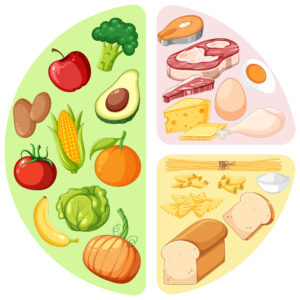 Main food groups macronutrients vector illustration
Main food groups macronutrients vector illustration
Healthy fats, also known as unsaturated fats, are essential for various bodily functions, including hormone production, nutrient absorption, and cell membrane integrity. They are divided into two main categories: monounsaturated fats and polyunsaturated fats.
Monounsaturated Fats: These fats are found in foods like avocados, olive oil, and nuts. They help reduce bad cholesterol levels, which can lower the risk of heart disease and stroke.
Polyunsaturated Fats: These include omega-3 and omega-6 fatty acids, which are essential fats that the body cannot produce on its own. Omega-3 fatty acids, found in fatty fish, flaxseeds, and walnuts, are particularly known for their anti-inflammatory properties and benefits for heart health.
Types of Healthy Fats
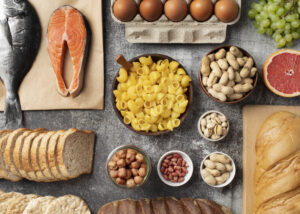 By incorporating a variety of healthy fats into your diet and being mindful of portion sizes, you can reap the many benefits they offer for overall health and well-being. Healthy fats are an essential component of a balanced diet and can support your weight loss goals when consumed as part of a nutritious eating plan
By incorporating a variety of healthy fats into your diet and being mindful of portion sizes, you can reap the many benefits they offer for overall health and well-being. Healthy fats are an essential component of a balanced diet and can support your weight loss goals when consumed as part of a nutritious eating planTypes of Healthy Fats: Healthy fats primarily consist of monounsaturated fats, polyunsaturated fats (including omega-3 and omega-6 fatty acids), and some saturated fats in moderation. Each type offers unique health benefits and sources. For instance, monounsaturated fats are found in olive oil, avocados, and nuts, while polyunsaturated fats are abundant in fatty fish, flaxseeds, and walnuts.
Omega-3 Fatty Acids: Omega-3 fatty acids are essential fats that have been linked to numerous health benefits, including reducing inflammation, improving heart health, and supporting brain function. Fatty fish like salmon, mackerel, and sardines are excellent sources of omega-3s, while plant-based sources include flaxseeds, chia seeds, and walnuts.
Omega-6 Fatty Acids: While omega-6 fatty acids are also essential for health, the modern Western diet often contains an imbalance of omega-6 to omega-3 ratios, which may contribute to inflammation and certain health issues. It’s important to consume omega-6 fats from sources like nuts, seeds, and vegetable oils in moderation and ensure a balanced intake of omega-3s.
Plant-Based Sources: Many plant-based foods are rich in healthy fats, making them suitable options for vegetarians and vegans. In addition to nuts and seeds, sources of healthy fats include olives, olive oil, coconut, and avocado. These foods not only provide healthy fats but also offer a range of vitamins, minerals, and antioxidants.
Cooking with Healthy Fats: When cooking with fats, it’s important to choose cooking oils that are stable at high temperatures to avoid oxidation and the formation of harmful compounds. Some good options for cooking include coconut oil, avocado oil, and ghee (clarified butter), which have high smoke points and retain their nutritional properties when heated.
Balancing Fatty Acid Intake: While healthy fats offer numerous benefits, it’s essential to consume them in moderation and maintain a balanced diet. Too much fat, even from healthy sources, can contribute to excess calorie intake and weight gain. Aim to include a variety of healthy fats in your diet while being mindful of portion sizes.
Reading Labels: When selecting packaged foods, it’s important to read labels and choose products with healthier fat sources and lower amounts of saturated and trans fats. Avoid products containing partially hydrogenated oils or artificial trans fats, as these can have detrimental effects on health.
The Role of Healthy Fats in Weight Loss
Top 3 Sources of Healthy Fat

Healthy fats play a crucial role in supporting weight loss and overall health. Contrary to common misconceptions, including healthy fats in your diet can aid in achieving and maintaining a healthy weight. Here’s how healthy fats contribute to weight loss:
Promoting Satiety: Healthy fats are more satiating than carbohydrates or proteins, meaning they help you feel full and satisfied after meals. This can lead to reduced overall calorie intake and fewer cravings for unhealthy, high-calorie foods.
Boosting Metabolism: Certain types of healthy fats, such as medium-chain triglycerides (MCTs) found in coconut oil, can increase your metabolic rate. A higher metabolism means your body burns more calories, even at rest, which can support weight loss efforts.
Providing Essential Nutrients: Healthy fats are a concentrated source of energy and provide essential fatty acids that your body needs for various functions, including hormone production and nutrient absorption. Including adequate amounts of healthy fats in your diet ensures your body can function optimally, which is essential for weight loss.
Balancing Blood Sugar Levels: Consuming healthy fats can help stabilize blood sugar levels by slowing down the absorption of carbohydrates. This prevents spikes and crashes in blood sugar, which can lead to overeating and weight gain.
Supporting Muscle Maintenance: Healthy fats are important for preserving muscle mass, especially during weight loss. By including healthy fats in your diet, you can help ensure that your body burns fat for fuel instead of breaking down muscle tissue.
Improving Cardiovascular Health: Certain healthy fats, such as monounsaturated and polyunsaturated fats found in avocados, nuts, and seeds, have been shown to improve cardiovascular health. A healthy heart is essential for overall well-being and can support your weight loss journey.
Overall, incorporating a variety of healthy fats into your diet, such as avocados, nuts, seeds, and fatty fish, can have numerous benefits for weight loss and overall health. By prioritizing healthy fats and balancing your macronutrient intake, you can optimize your diet for sustainable weight loss success.
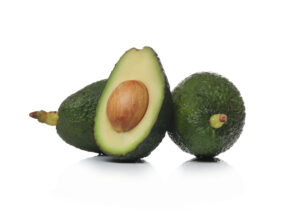
1. Avocado: The Monounsaturated Marvel
Avocado is a nutrient-dense fruit loaded with monounsaturated fats, which are known for their heart-healthy properties. Here’s why avocados are a fantastic addition to your diet:
- Rich in Fiber: Avocados are high in fiber, promoting a feeling of fullness and aiding in digestive health.
- Nutrient Powerhouse: They provide essential vitamins and minerals, including potassium, which helps in reducing water retention and bloating.
- Versatile and Delicious: Avocados can be added to salads, smoothies, or simply enjoyed on their own, making them easy to incorporate into your diet.
How to Include Avocado in Your Diet: Add half an avocado to your morning smoothie, top your toast with avocado slices, or enjoy a hearty avocado salad for lunch.
 2. Coconut Oil: The Metabolism Booster
2. Coconut Oil: The Metabolism Booster
Coconut oil is a unique fat source because it contains medium-chain triglycerides (MCTs), which are metabolized differently than other fats. Here’s how coconut oil can help you lose weight:
- Increases Energy Expenditure: MCTs in coconut oil can increase the number of calories your body burns at rest.
- Reduces Appetite: Studies have shown that MCTs can reduce appetite, helping you consume fewer calories.
- Quick Energy Source: Coconut oil provides a rapid energy boost, perfect for pre-workout snacks or adding to your coffee for sustained energy.
How to Include Coconut Oil in Your Diet: Use coconut oil for cooking, add a spoonful to your morning coffee, or blend it into your smoothies.
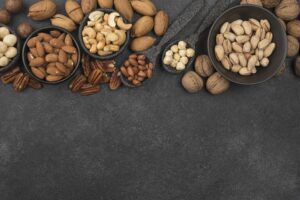 3. Nuts and Seeds: The Fiber and Protein Powerhouses
3. Nuts and Seeds: The Fiber and Protein Powerhouses
Nuts and seeds, such as almonds, chia seeds, and flaxseeds, are excellent sources of healthy fats, fiber, and protein. Here’s why they’re great for fat loss:
- High in Protein: Protein is essential for muscle repair and growth, which in turn helps boost your metabolism.
- Rich in Fiber: The fiber content in nuts and seeds promotes satiety and helps regulate blood sugar levels.
- Nutrient-Dense: They provide a wealth of essential nutrients, including vitamins, minerals, and antioxidants.
How to Include Nuts and Seeds in Your Diet: Snack on a handful of almonds, sprinkle chia seeds on your yogurt or oatmeal, or add flaxseeds to your smoothies and salads.
Incorporating Healthy Fats into Your Diet
 Adding healthy fats to your diet doesn’t have to be a daunting task. With a few simple adjustments, you can enhance your meals and snacks, making them both nutritious and delicious. Here are some practical tips and ideas to help you incorporate healthy fats into your daily eating plan.
Adding healthy fats to your diet doesn’t have to be a daunting task. With a few simple adjustments, you can enhance your meals and snacks, making them both nutritious and delicious. Here are some practical tips and ideas to help you incorporate healthy fats into your daily eating plan.
Start Your Day Right
1. Smoothie Boost: Add a tablespoon of chia seeds or flaxseeds to your morning smoothie. These seeds are rich in omega-3 fatty acids, fiber, and antioxidants.
2. Avocado Toast: Spread ripe avocado on whole-grain toast and sprinkle with a pinch of salt, pepper, and a drizzle of olive oil for a satisfying breakfast or snack.
3. Nutty Oatmeal: Stir a spoonful of almond butter or a handful of chopped nuts into your oatmeal. This not only adds healthy fats but also provides a protein boost to keep you full longer.
Smart Snacking
4. Mixed Nuts: Keep a small portion of mixed nuts (such as almonds, walnuts, and pistachios) handy for a quick and nutritious snack. Nuts are packed with monounsaturated fats, protein, and fiber.
5. Greek Yogurt Toppings: Top your Greek yogurt with flaxseeds, chia seeds, or a few pieces of dark chocolate. This adds texture and a dose of healthy fats to your snack.
6. Hummus and Veggies: Pair fresh vegetables with a serving of hummus made from olive oil and tahini. It’s a great way to enjoy a crunchy, low-calorie snack that’s also rich in healthy fats.
Cooking and Meal Preparation
7. Use Healthy Oils: Swap out butter and margarine for olive oil or coconut oil when cooking. These oils are great for sautéing vegetables, roasting meats, and even baking.
8. Fatty Fish: Incorporate fatty fish like salmon, mackerel, and sardines into your dinner plans at least twice a week. Grill, bake or broil them for a delicious and heart-healthy meal.
9. Salad Enhancements: Enhance your salads with slices of avocado, a handful of nuts, and a drizzle of olive oil-based dressing. These additions provide flavor, texture, and healthy fats.
Dining Out and On-the-Go
10. Mindful Choices: When dining out, opt for dishes that feature healthy fats. Choose grilled or baked fish, salads with olive oil dressing, or avocado-based dishes.
11. Pack Healthy Snacks: If you’re always on the go, pack snacks that travel well, such as trail mix, nut butter packets, or homemade energy bars made with nuts and seeds.
Delicious Recipes to Try
12. Guacamole: Make your guacamole with ripe avocados, lime juice, cilantro, and diced tomatoes. Enjoy it with whole-grain crackers or veggie sticks.
13. Pesto Pasta: Whip up a quick pesto sauce using fresh basil, garlic, pine nuts, and olive oil. Toss it with whole-grain pasta for a nutritious and filling meal.
14. Chia Pudding: Combine chia seeds with almond milk and a touch of honey, then let it sit overnight in the fridge. Top with fresh berries and a sprinkle of nuts for a delicious breakfast or dessert.
Benefits of Eating Healthy Fats
1.Regulating Blood Sugar Levels
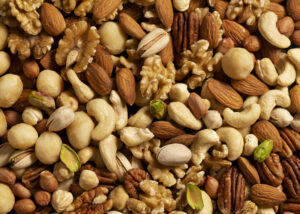 Healthy fats can play a significant role in regulating blood sugar levels. When you consume carbohydrates, your blood sugar levels can spike, leading to an increase in insulin production. Insulin is a hormone that helps cells absorb glucose from the blood, but high levels can also promote fat storage. Healthy fats slow down the absorption of glucose into the bloodstream, preventing these spikes and helping to stabilize blood sugar levels. This stabilization can reduce insulin spikes and fat storage, making it easier to manage weight.
Healthy fats can play a significant role in regulating blood sugar levels. When you consume carbohydrates, your blood sugar levels can spike, leading to an increase in insulin production. Insulin is a hormone that helps cells absorb glucose from the blood, but high levels can also promote fat storage. Healthy fats slow down the absorption of glucose into the bloodstream, preventing these spikes and helping to stabilize blood sugar levels. This stabilization can reduce insulin spikes and fat storage, making it easier to manage weight.
2. Preserving Muscle Mass
During weight loss, it’s essential to maintain muscle mass. Muscle tissue burns more calories than fat tissue, even at rest. Healthy fats, particularly those rich in omega-3 fatty acids, can help preserve muscle mass while you lose fat. Omega-3s have anti-catabolic properties, meaning they help prevent muscle breakdown. By preserving muscle mass, you maintain a higher metabolic rate, which is crucial for long-term weight loss and maintenance.
3. Improving Mental Health and Focus
Healthy fats are essential for brain health. Omega-3 fatty acids, in particular, support cognitive function, reduce symptoms of depression, and improve overall mental health. When you’re mentally sharp and emotionally balanced, you’re more likely to make healthier food choices and stick to your weight loss plan. Better focus and mood can lead to more consistent exercise and adherence to your dietary goals
4. Supporting Gut Health
Healthy fats can also support gut health, which is increasingly recognized as important for weight management. Certain fats, like those found in nuts and seeds, provide the necessary building blocks for the production of gut-protective compounds. A healthy gut microbiome aids digestion, improves nutrient absorption, and regulates metabolism. A well-functioning digestive system can enhance your body’s ability to lose weight and maintain a healthy weight.
Coclusion
Healthy fats are a powerful ally in your weight loss journey. They enhance satiety, boost metabolism, provide steady energy, support hormone function, improve nutrient absorption, reduce inflammation, regulate blood sugar levels, preserve muscle mass, improve mental health, and support gut health. By incorporating avocados, coconut oil, nuts, and seeds into your diet, you can harness the transformative power of these fats to achieve your weight loss goals. Embrace healthy fats as part of a balanced diet, and enjoy the benefits of a healthier, leaner body.
FAQS
1. Are fats bad for weight loss?
No, not all fats are bad for weight loss. Healthy fats play a crucial role in supporting fat loss by promoting satiety, boosting metabolism, and providing essential nutrients. It’s important to distinguish between healthy fats, such as those found in avocados, nuts, and seeds, and unhealthy fats, like trans fats found in processed foods, which should be limited in a weight loss diet.
2. How much fat should I consume for weight loss?
The amount of fat you should consume for weight loss depends on various factors, including your age, gender, activity level, and overall calorie intake. As a general guideline, aim to get about 20-35% of your daily calories from fat, with a focus on healthy sources. Be mindful of portion sizes and choose unsaturated fats over saturated and trans fats whenever possible.
3. Can I eat avocados and nuts every day for weight loss?
Yes, you can include avocados and nuts in your daily diet for weight loss, but it’s essential to practice portion control. While these foods are nutritious and provide healthy fats, they are also calorie-dense. Stick to recommended serving sizes to avoid consuming excess calories, which can hinder your weight loss progress.
4. Will eating fats make me gain weight?
Eating fats alone will not necessarily make you gain weight. Weight gain occurs when you consume more calories than your body needs, regardless of whether those calories come from fats, carbohydrates, or protein. However, it’s essential to choose healthy fats and incorporate them into a balanced diet to support overall health and weight management.
5. Can coconut oil help me lose belly fat?
Coconut oil has been touted for its potential to reduce belly fat due to its high content of medium-chain triglycerides (MCTs). While some studies suggest that MCTs may promote fat loss, particularly around the abdomen, more research is needed to confirm these effects. Including coconut oil as part of a balanced diet and active lifestyle may contribute to overall weight loss efforts, but it’s not a magic solution for targeting belly fat specifically.
6. Are all fats created equal?
No, not all fats are created equal. There are different types of fats, including saturated fats, unsaturated fats, and trans fats, each with unique effects on health. Healthy fats, such as monounsaturated and polyunsaturated fats, are beneficial for heart health and weight management when consumed in moderation. On the other hand, trans fats are harmful and should be avoided as much as possible due to their negative impact on cholesterol levels and cardiovascular health.

